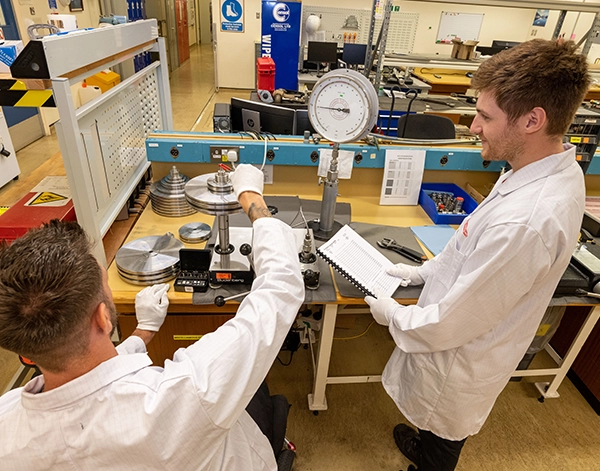BA (Hons) - Chartered Management Degree Apprenticeship
The Chartered Management Degree Apprenticeship is designed to help you develop the management expertise needed to progress your career by combining higher level academic knowledge, understanding and skills with the opportunity to contextualise this provision in the workplace. Designed in conjunction with a wide range of employers, the degree apprenticeship provides insights into the latest industry trends and develops contemporary skills such as resilience, future strategic thinking, innovation and business continuity management.

- Provide you with knowledge that is specific to the context of your industry, and assessment that is applicable to your sector of employment, through a team with both academic and industry expertise.
- Gain detailed understanding of more established management skills in organisational performance and interpersonal excellence that has been designed in-line with the Chartered Management Institute (CMI) Apprenticeship Standards.
- Equip you with the skills needed to meet current and future challenges for business success, as you study a programme that has been designed by industry, for industry.
The degree has been ‘designed by industry for industry’ with learning outcomes that are carefully aligned to meet the current and future challenges for business success and provide a rich and relevant context for learners.
Modules
Year One
Year 1 (Level 4) helps students develop their knowledge, skills and behaviour at foundation level. Modules are led through discussions about business operations and impacts. Students gain a broad understanding of each other's business sector, what their business environment is and how they are approaching challenges.
- Business Operations
- This module introduces business and management theory in terms of its potential use and application within the dynamics of the contemporary business environment.
- Managing Workplace Relationships
- This module explores the types and purposes of a range of workplace relationships and the skills required to overcome challenges and manage these effectively.
- Creativity and Innovation
- You will be introduced to the main principles and concepts associated with creativity and innovation and consider the factors that can impact on developing new ideas within the business.
- Business Analytics
- This module will equip you with an understanding of the purpose and practices of collecting, interpreting, managing and presenting business data and information to inform on decision making.
- Business Finance
- This module provides you with an understanding of the financial tools associated with the successful management of business at both a strategic and operational level.
- Work Based Learning 1
- This module provides you with the opportunity for you to reflect upon the academic year at level 4. You will consider your personal growth and developing skill set as a manager and your impact on the business to date.
Year Two
Year two (Level 5) builds on the knowledge and skills explored at Level 4. The module themes of people, finance and operations are developed through a more focused look at workforce behaviour, planning and business tools .
- Project Planning
- You will cover a range of concepts, tools and frameworks specific to project planning and management helping you to analyse the constraints of time, quality, cost and the consumer on the development of a new project within a business.
- PR & Sales
- This module introduces the concepts of PR and sales as critical functions in the modern day organisation and develops your understanding of CRM, sales analytics, developing a PR campaign, the use of social media as a tool, as well as technology enabled selling that creates value in the mind of the customer
- Organisational Behaviour
- You will explore and evaluate the impact of an organisation’s structure, culture, behaviour and governance on management and leadership and organisational success.
- Inclusion and Business Dynamics
- The aim of the module is to explore the move from current business contexts and practices, previously based simply on management and marketing principles, economic growth & profiteering to those holistically inclusive of ecological, eco-environment and humanistic principles.
- Business Case Development
- The aim of this module is to enable you to develop the skills necessary to construct a robust business case, in preparation for your Level 6, 40 credit Synoptic Business Report, that is resilient in the face of the dynamic and challenging business environment.
- Work Based Learning 2
- This module provides you with the opportunity for you to reflect upon the academic year at level 5. You will consider your personal growth and developing skill set as a manager and your impact on the business to date.
Year Three
Year three (Level 6) is a culmination of learning demonstrated through a synoptic business report and the completion of the Portfolio of evidence to gain professional management status. Level 6 focuses on business strategy, sustainability and impact.
- Future Strategic Thinking
- This module provides a contemporary view on strategic thinking and management and considers the immediate and future opportunities and challenges for businesses operating in a range of contexts.
- Digital Marketing
- This module introduces you to the fast-moving world of digital marketing technologies and their applications where you will consider a range of digital channels and their suitability for inclusion in an effective integrated online and off-line marketing programme and campaign.
- Responsible Leadership
- You will develop your understanding of responsible and ethical leadership by examining leadership models and the concept of coaching, motivation and empowerment, drawing on a range of techniques and methods for effectively leading others.
- Synoptic Business Project
- This double weighted module synthesises the knowledge, skills and behaviours developed during the course of your degree, providing you with the opportunity to undertake a substantive project that focuses on the exploration and resolution of a workplace change issue.
- Business Continuity and Risk Management
- This module will enable you to understand the necessity of preparing, planning and implementing a business continuity and risk management plan to safeguard sustainable business practice and develop a response that ensures the protection of organisational reputation through planned and modelled response.
How you will learn
As an apprentice at the University of Cumbria, you are part of an inclusive learning community that recognises diversity. You will have opportunities to learn by interacting with others in a collegiate, facilitative and dynamic learning environment. Teaching, assessment and apprentice support will allow equal and equitable opportunities for you to optimise your potential and develop autonomy.
We seek to create a stimulating and innovative community of learning, whether encountered on campus or at a distance, on placement or in the workplace. Facilitated by our expert practitioner staff, you will experience a learning environment that is well equipped, flexible, and stimulating.
How you will be assessed
We have a wide range of formative and summative assessment methods to accommodate individuals' preferences and strengths.
Assessment methods include formal written reports, reflective writing, exams, and face to face and digital presentations.
All assessments can be applied to your existing real-world context, providing opportunities for engagement with industry partners and enhanced employability in terms of developing your key skills and knowledge. Your experience and the research conducted as part of your programme feeds into the academic debates and discussions ensuring the currency of debate and in class discussion.
Apprentices will complete the End Point Assessment which includes presenting their Synoptic Business Project, with questioning and being questioned by the panel on their professional portfolio of evidence.
96 UCAS Points
GCSE English and Maths at Level 2
A levels or existing relevant Level 3 qualifications
Information
Individual employers will set the selection criteria for their apprenticeships. Entry to the course requires evidence of successful study at Level 3, A-Level, or equivalent. English and Maths at Level 2 (GCSE) grade 4 (C) or higher are also expected.
You should also have:
- Appropriate industry experience that demonstrates a range of knowledge, skills and behaviours appropriate to the degree.
- Be a UK/EU/EAA resident for at least three years prior to starting the course.
- Have left full-time education when the apprenticeship starts.
- Be at least 18 years old, but there is no upper age limit.
- Right to work in the UK.
Fair Admissions
When you apply, our Admissions specialists will review your whole application. We are looking for your potential to succeed so will assess your qualifications, any relevant work experience, your personal statement, and references.
Where you have received a conditional offer subject to achieving particular grades/UCAS tariff scores, and do not quite meet these scores, please try not to worry, where vacancies exist our Admissions specialists will review your whole application again and take account of any mitigating circumstances and reassess your suitability for the course.
Degree apprenticeships are only offered to students undertaking the course as part of their employment. The apprenticeship training is therefore funded by the employer using their apprenticeship levy, with or without a contribution, depending on the size and status of the organisation.
Apprentices will not be required to pay any fees and will not be eligible for Student Finance England maintenance support as they are in receipt of a salary. See further information on our Information for Aspiring Apprentices page.
The University will typically charge the maximum fee for the standard, before applying reductions based on accepted prior learning, which is determined on an individual basis at the application stage. To discuss sponsoring a learner on a programme please contact apprenticeships@cumbria.ac.uk.
Additional Costs
There will be some additional costs associated with the course including stationery, textbooks, field trips and membership fees although some of these features are optional.
Books are reviewed annually and are therefore subject to change, course welcome information will provide you with an indicative list for the year.
Core texts and reading materials for each module are regularly reviewed by the module leaders. Students have access to the module resources on the University Library site and additional materials will be uploaded onto the learning platform.
Students are asked to bring a laptop or tablet device to modules. Students who do not have a personal device can borrow a laptop from the library



